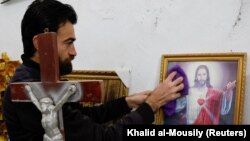The Christian community has been in Iraq for over two thousand years. In recent decades, war, persecution, violence, and forced displacement have drastically diminished its numbers. Estimates are that in 2003 1.5 million Christians lived in Iraq; now, after the fall of Saddam Hussein, the rise of al-Qaida and ISIS, and the formation and tactics of the Iran-backed Popular Mobilization Forces, the number has dwindled to 150,000.
Recently a new blow has fallen on the Christian community, in particular, on Chaldean Catholics who make up approximately 67% of Christians in Iraq. On July 3, Iraqi President Abdul Latif Rashid suddenly revoked a 2013 decree that recognized Cardinal Louis Raphael Sako as patriarch of the Chaldean Church. On July 15, Cardinal Sako announced he would “retire from the patriarchal See in Baghdad and move...to one of the monasteries of Iraqi Kurdistan.”
Cardinal Sako, an outspoken advocate who expressed fear that Christians are disappearing from Iraq because of persecution, apparently no longer feels safe in Baghdad. In a letter to Iraqi President Rashid, the Cardinal said the “deliberate and humiliating campaign” against him was led by Rayan al-Kildani, head of the purportedly Christian 50th Babylon Brigade militia, part of the pro-Iran Popular Mobilization Forces, that has occupied many Christian towns.
In its most recent international religious freedom report, the U.S. State Department noted the 50th Babylon Brigade has been involved “in extortion, unlawful arrests, kidnapping and detention of individuals without warrants.” The U.S. Treasury Department sanctioned its leader al-Kildani for serious human rights abuses, including persecution of religious minorities, illegally seizing and selling agricultural land, and for intimidation, extortion, and harassment of women.
Cardinal Sako, along with other observers, believe the campaign against him is a tactic to usurp the his authority and to seize the remainder of what Christians have left in the country.
The United States is disturbed by the treatment of Cardinal Sako. Noting that the Iraqi Christian community “is a vital part of Iraq’s identity and a central part of Iraq’s history of diversity and tolerance,” State Department Spokesperson Matthew Miller called the Cardinal “a respected leader of the Church...under attack from a militia leader who remains under sanctions.”
Spokesperson Miller said the Cardinal’s plight is “a blow to religious freedom. And that’s why,” he declared, “we have engaged directly with the Iraqi Government to make our concerns clear.”

















